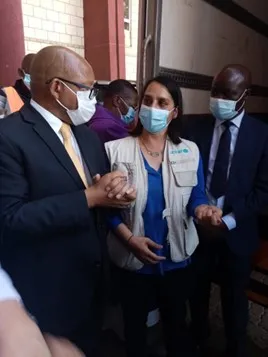Day-in, Day-out Support gets Less Visibility, but Because of it We Progress

This blog is part of a series written by President and CEO Sevaun Palvetzian celebrating humanitarians across UNICEF.
As a university student, I spent a summer backpacking through Europe. The Canadian flag was stitched to my pack. It really is an instant friend-finder; the Canadian bond extends beyond our borders.
It’s been years since I formed pen pals in hostels, but making connections with fellow Canadians abroad continues. Including, recently, during a trip to the United Nations in NYC for the UNICEF Executive board meetings.
Before the formalities kicked off, I spent a day getting to know some of the people in and around UNICEF; among them, a Canadian named Anurita Bains.
Anurita has had a long and incredible career as a humanitarian. In UNICEF Lesotho, leading the UNICEF office, she worked to bring COVID-19 vaccines to the country under COVAX at the height of the pandemic. Across the country, she and her team worked to restore water supply to schools and health care facilities benefiting thousands of children and their families.
But it’s her current role, as Associate Director, HIV and AIDS at UNICEF that’s captured her skills, focus and dedication. Anurita’s domain expertise in this topic is incredible; as is UNICEF’s ambition: to end AIDS by 2030.
Children have long lagged behind adults in the global AIDS response. Progress has nearly flatlined in this area which is why there are 3 key pillars to UNICEF’s HIV work:
- Women living with HIV need access to services to stop the transmission of HIV to their babies during pregnancy, delivery or breastfeeding;
- Pediatric treatment is essential: without it, half the babies living with HIV will die before their second birthday. Early testing and action with community workers is key: so UNICEF is scaling up diagnostics throughout sub-Saharan African so infants can be tested and start treatment on the same day;
- Focus on adolescents is essential: education is needed for prevention, treatment and care - especially for adolescent girls.
Anurita is quick to share the progress that’s been made in HIV response, and the traction that’s underway to tackle it. But she also lays out the reality still ahead: one child dies every five minutes from AIDS-related causes.
Humanitarians like Anurita are determined to leave no child behind.
“It’s rewarding when you work with a government and see how progress is made on the situation of HIV in a country. I’ve seen how UNICEF staff have supported data analysis, mobilized resources for children, adolescents and pregnant women at risk of HIV, and ensured that services reach people living with HIV at community level. This kind of day-in, day-out support gets less visibility, but because of it we progress. We're going in the right direction.”
We see it. We need it. And we appreciate it, Anurita.
